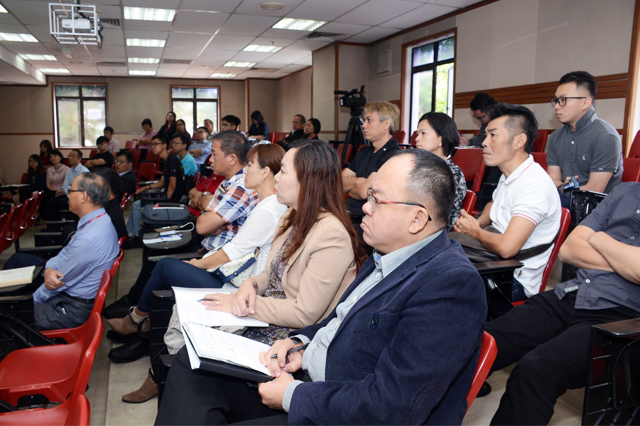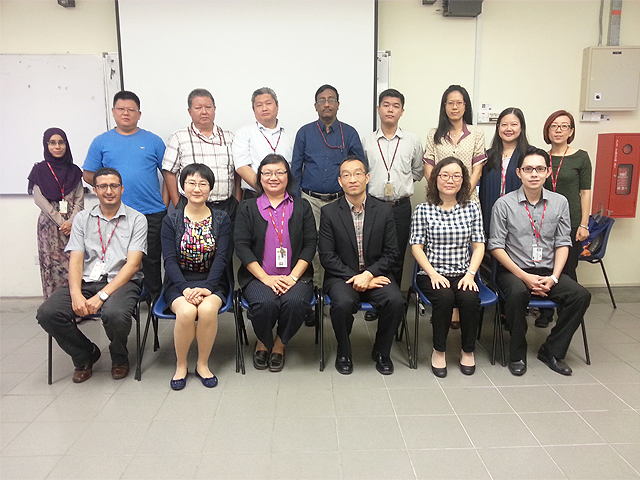
UTAR successfully organised two dialogue sessions with two delegates from the China Executive Leadership Academy Pudong (CELAP). The first was hosted by the Institute of Management and Leadership Development (IMLD) on 4 January 2017 at Sungai Long Campus, while the second was hosted by the Centre for Economic Studies (CES), parked under the Faculty of Business and Finance (FBF) on 9 January 2017 at Kampar Campus.
The delegates were CELAP Division of Foreign Affairs Director Zhao Xiuhua and CELAP Department of Economics and Business Administration Lecturer Dr Yang Zhiqiang. UTAR inked an MoU with CELAP in Shanghai, China on 12 May 2015. Since then, both parties have maintained cordial and active interactions through various activities such as talks and visits.
Present on the first day was IMLD and Division of Community and International Networking Director Prof Dr Cheng Ming Yu, while the second day saw the presence of FBF Dean Dr Au Yong Hui Nee, FBF Deputy Dean for R&D and Postgraduate Programmes Dr Lau Lin Sea, FBF Head of Postgraduate Degree Programmes Dr Abdelhak Senadjki, Chairperson of CES Dr Yii Kwang Jing, and Chairperson of Centre for Accounting, Banking and Finance Dr Krishna Moorthy Manicka Nadar. Both were also attended by numerous academics, postgraduate students and members of the public.
Aimed at encouraging the interaction between UTAR academics and scholars from CELAP, the dialogue sessions emphasised on the aspects of socio-economic, educational, political and cultural development in Malaysia. In addition to that, they also elucidated on One Belt One Road (OBOR), a development strategy and framework proposed by China.

Dr Yang (left) and Zhao speaking at the dialogue sessions
Dr Yang spoke on “China’s One Belt One Road (OBOR) Initiative: Globalisation (全球化背景下的‘一带一路’倡议)”. The focus of China’s economic diplomacy since 2013, OBOR’s core is to promote regional and cross-continental connectivity between China and Eurasia. The “One Belt” and “One Road” refer to China’s proposed “Silk Road Economic Belt” and “Maritime Silk Road” respectively. These two cover five major areas of interest, namely policy coordination, infrastructure construction, unimpeded trade, financial integration and people-to-people ties. Among these, infrastructure construction is the dominant feature of the New Silk Road. While the historical Silk Road was an upshot of bottom-up trade activities, driven mainly by nations outside China. OBOR represents the first major attempt by China to design and implement a cross continental commercial strategy. Dr Yang emphasised on three issues: the current economic environment, the concept of OBOR and its influence, and strategies to promote OBOR.
Dr Yang further deliberated on the impact of OBOR towards small and medium-sized enterprises (SMEs) and explained how SMEs could contribute a high percentage in the gross domestic product (GDP) of a country. Besides that, the discussions also stressed on the issues of environment and urbanisation in both Malaysia and China.
Zhao, however, illuminated the audiences with her talk titled “Executive Leadership Education and Training in China (中国的干部教育培训)”. She introduced the leadership education and training system used in China, as well as its development throughout the years. Zhao explained the background of CELAP, a Shanghai-based national institution funded by the central government aimed at providing trainings for senior leaders from government sectors and top executives from the business community. Referencing the governance culture in China, Zhao highlighted CELAP’s roles and vast experience in training executive leaders from various countries.

The audience at Sungai Long Campus
At the dialogue session held in Kampar Campus, Dr Au Yong also spoke on the environmental legislation and development in Malaysia. She shared the statistics of Malaysia’s biodiversity productivity and generation of waste. She further explained about the Environmental Quality Act 1974 for land, water and air in Malaysia, as well as described on the promotion of investment in renewable energy to achieve a low-carbon society.
This was followed by Dr Abdelhak who delivered a talk related to the influence of modern technologies on cybercrime among Malaysian youth. He raised the issue of the misuse of modern technologies as an emerging trend among Malaysian youth. He explained that the access and usage of modern technology moderately influences youth involvement in cybercrime activities. Thus, he suggested some recommendations to address the issue, among them were the control and educate policy, the provision of proper avenues, the three-stage construct (awareness-knowledge-culture) and SERU (Safe and Responsible Use of Internet).
Chairperson of CES Dr Yii Kwang Jing said, “This was a good platform for UTAR academics to understand better the knowledge related to China’s economic development, environmental issues and OBOR. The discussions also encouraged both academics from UTAR and CELAP to focus on potential research collaborations relevant to issues parked under OBOR. The sessions also provided a stage for UTAR academics to contribute and share their perceptions and insights on OBOR, while the visiting scholars were able to understand the social, cultural and political development of Malaysia.”
The dialogue sessions ended with a presentation of souvenirs by Prof Cheng and Dr Au Yong respectively on each day to Zhao and Dr Yang.

Prof Cheng presenting souvenirs to the speakers

Seated, from left: Dr Abdelhak, Zhao, Dr Au Yong, Dr Yang, Dr Lau and Dr
Yii with other staff from UTAR Kampar Campus
© 2019 UNIVERSITI TUNKU ABDUL RAHMAN DU012(A).
Wholly owned by UTAR Education Foundation Co. No. 578227-M LEGAL STATEMENT TERM OF USAGE PRIVACY NOTICE